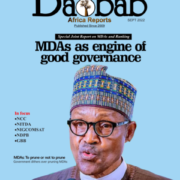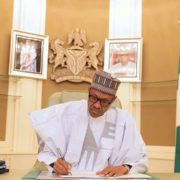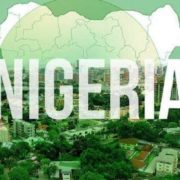By Abiodun KOMOLAFE
In most human societies, visible phenomena are oftentimes credited or associated with the causes of other events. Then, the analysis will take off from there. But, most often, there are other unknown forces or factors that are not easily discernible but are sometimes the real causes, or, responsible for a particular phenomenon. Take, for instance, what started as #EndSARS focussed mainly on police brutality. Somewhere along the line, other unknown-but-important factors such as youth unemployment, hunger, frustrations, lack of opportunities, bad political leadership, economic hardship and subhuman standard of living contributed largely to what was surnamed #EndSARS. Unfortunately, ending (the) SARS has not removed the other problems!
SARS was removed and … given another name (which was merely a change in nomenclature) but, so far, it has not changed the societal living conditions. So, #EndSARS was just like an arrowhead. At a glance, the given title of the protest did not portray the whole picture or capture the expressed anger of the people. It was after the decentralised social movement took off that other things, including youth restiveness, started showing up. So, the youths served as ready tools for venting the deep-seated frustrations; #EndSARS only provided an avenue for the free deployment of their energy. Indeed, that’s why it took such a fatal form of expression. Unfortunately, the government took things for granted!
In the same light, prior to the Year 2023 general elections, insecurity had become an exasperating omen in Nigeria. Poverty seemed to be adamant, despite all attempts by the outgoing national government to address it. University students were frustrated and were even on strike for the better part of last year. Their lecturers were agitated and, as at the time of putting this piece together, their demands remained largely unaddressed. In all, President Muhammadu Buhari’s promises on assumption of office in 2015 seem not to have seen the light of day, eight years after. So, generally, Nigerians are frustrated!
Beyond question, all these and other issues are a thing to look for as the starting point for the incoming government. The Bola Tinubu-led government must sum up all these itemised issues with a view to addressing them because it is the minimum irreducible effort that can make Nigerians know that his government will be responsible and responsive. But to just come with the usual whimsical approach that won’t edify democracy or speak directly to what has led us to this sordid pass will not be pleasing to the masses. Therefore, Tinubu must show that he has the capacity to handle the situation better and differently. Doing otherwise will only amount to a journey back to ‘one chance’ government!
Let’s start with Nigeria’s current security situation. Let Tinubu’s government recruit more soldiers, proceed with their training and put them at strategic fighting positions. Let him also import help – munitions and allied military hardware – from abroad so that the country will begin to feel safe. Once that happens and people can see it, they will begin to appreciate the essence of a new era. Without doubt, it is an insult on our collective intelligence for criminal Fulani herdsmen to take their cattle to a man’s farm to eat up what he has all his life laboured for. They won’t even stop at that; they will kill the farmer and nothing will happen! The sadder side is that these herdsmen are not ashamed, because, to them, it is a way of life! So, Tinubu must look beyond RUGA as a method of rearing cattle. Until he does that, nothing is likely going to change!
There’s another major area which Tinubu must look into; and that is, freeing the states to think outside the box! For example, if it is possible for Osun to make camel rearing a profitable venture, let the state rear it to the extent that it can export same with a view to boosting its Internally Generated Revenue (IGR). If Edo State can also think of generating solar energy that can power the entire country, let it go ahead and develop it. To put it succinctly, Tinubu’s government should work towards the states behaving like federal states, not just states that will always go to Abuja every month, cap-in-hand, to beg for alms in the garb of monthly allocations.
At a time like this, failure to notice and analyse the current trend in the judiciary a la Nigeria’s political firmament can only be likened to a monkey missing its branch. Though what the Bar and the Bench see and exploit as technical issues will never be known to a layman, some certain impressions are created which may not sit well with the ethics of the legal profession. Quite sad, too, that what we have in Nigeria, presently, is not teaching us tolerance or how to embrace the rule of law. So, it is either we improve on our electioneering processes or transform our legislative interventions.
“In all, President Muhammadu Buhari’s promises on assumption of office in 2015 seem not to have seen the light of day, eight years after. So, generally, Nigerians are frustrated!”
A country without a vision goes nowhere! In other words, Nigeria will only develop if and when she has an executable Grand Plan for development. Therefore, the ingredients to bring a vision into fruition are what she needs! If Tinubu wants to move Nigeria towards Little London, let him work towards it until his last day in office. How he micromanages that aspect of his vision is left to him.
As Nigeria marches towards greatness, there’s a need for her to have a superior political will and target. For instance, immediately Lee Kuan Yew became conscious of Singapore’s sociocultural and multi-ethnic diversities, he came up with a policy, with education as its arrowhead. Needless to repeat that Yew’s policy has turned Singapore into a new bride globally. Back home, Lagos wouldn’t have become a dream destination for investors without the foresight of a man who gave the state a Marshall Plan. As fate would have it, that man is Nigeria’s next president!
Tinubu’s administration must also strive to strengthen the Rule of Law. The efficacy of the Rule of Law determines how safe a society is even as it enhances investors’ trust in any system. And this starts with the orientation of obedience to the rules and laws as simple as traffic laws. Yes, the nitty-gritty of business interactions is a high bar! When a foreigner observes that a man is in breach of traffic laws, what therefore gives the impression that such a defaulter will be a gentleman when it comes to contractual agreements? Basically, when people run away because of insecurity, oftentimes, it’s not just about the lack of physical safety, it also means they can’t have justice through the judicial process. People troop to Saudi Arabia today because the natives know their privileges and the foreigners know their limits. In the last 50 years, Dubai has practically striven to become what it is today. Since Nigeria also wants to develop, what stops her from learning from the above-mentioned countries, at least?
Lastly, if we can’t find people who can help transform our university system in Nigeria, why not go searching from other climes so that our universities can truly reflect capacity for the universality of knowledge? For God’s sake, why can’t the vice chancellors come from, say, California in the USA; even from among the Eskimos? With Nigeria’s present situation, getting the best for the university system should no longer be a product of nepotism! Let Tinubu change the terrible orientation for the better! This is the right time to utilize the right tools to get the right results. It is now or never!
May the Lamb of God, who takes away the sin of the world, grant us peace in Nigeria!
*Komolafe wrote in from Ijebu-Jesa, Osun State, Nigeria ([email protected])
COVER IMAGEA: The Africa Report.com





















